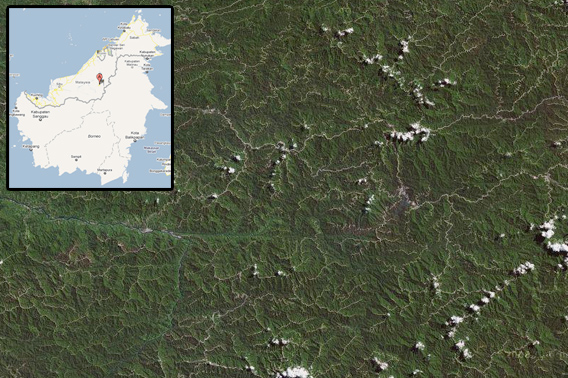
Logging roads in the rainforest of Sarawak. Image courtesy of Google Earth
Embattled Chief Minister of Sarawak Pehin Sri Abdul Taib Mahmud challenged independent observers to demonstrate that anything less than 70 percent of the Malaysian state’s forest cover is “intact” rain forest, according to an interview with Sarawak Reports, a pro-Taib web site created earlier this month.
Taib, who is caught up in a corruption scandal after 30 years of rule, was recently criticized by British former Prime Minister Gordon Brown, who described the deforestation of Sarawak as “probably the biggest environmental crime of our times”. Brown’s sister-in-law, Clare Rewcastle Brown, has led a campaign against Taib, whom she calls “one of the worst environmental criminals on the planet.”
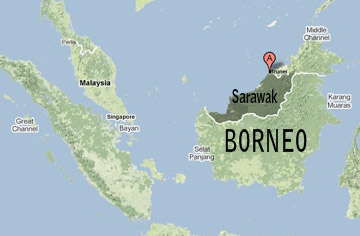 |
In the interview Taib refuted claims that 90 percent of Sarawak’s primary forests have been impacted by logging.
“People can make many claims, but my government has been very deeply committed to sustainable management of our forest,” he said, claiming that 70 percent of Sarawak’s forest was “intact”, while 14 percent has been replanted or is undergoing conversion to plantations.
“These are the simple facts and if people want to verify, they are welcome to Sarawak. I’ll be open for… independent inspection and I have nothing to hide.”
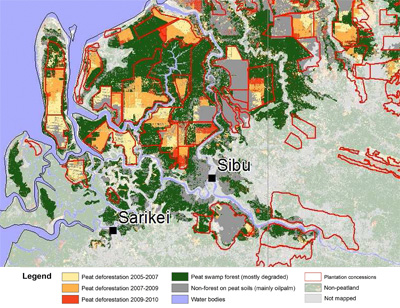 An analysis by Wetlands International and remote sensing institute Sarvision released earlier this year showed that more than one third (353,000 hectares) of Sarawak’s peatswamp forests and ten percent of the state’s rainforests were cleared between 2005 and 2010. |
Critics, led by Clare Rewcastle Brown’s Sarawak Report (not related to Taib’s Sarawak Reports) and Free Sarawak Radio, say that Taib, his family, and associates have earned billions in unreported income from logging and plantation development in Sarawak over the past three decades. The anti-Taib campaign has linked the Chief Minister to overseas properties worth hundreds of millions of dollars in the United States, Canada, and Australia.
Environmental and indigenous rights group assert that Sarawak’s forests have been heavy logged since Taib came to power. Last year, a massive logjam on the Rajang river, Malaysia’s longest river, proved an embarrassment for Sarawak’s logging industry. The government of Sarawak has since announced plans to covert more than one million hectares of forest, the majority of which is classified as native customary rights’ land, or belonging to indigenous communities, to oil palm plantations.
Related articles
Report: corruption in Sarawak led to widespread deforestation, violations of indigenous rights
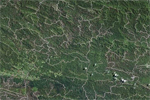
(03/10/2011) At the end of this month it will be 30 years since Abdul Taib Mahmud came to power in the Malaysian state of Sarawak. Environmentalists are using the occasion, along with new revelations, to highlight corruption and nepotism they say have characterized his regime. Chief Minister Taib and his decades-long administration are no strangers to such allegations, but a new report from the indigenous-rights group Bruno Manser Fund (BMF)—amid criticism from independent media sources, such as Sarawak Report and Radio Free Sarawak—are adding fuel to the fire. Most recently, the report describes in great detail how the tropical timber trade in Sarawak has undercut indigenous groups while toppling some of the world’s greatest rainforests, all at the expense of the Sarawak people.
Sarawak government mocks its indigenous people
(02/20/2011) The Sarawak government mocked the plight of its rainforest people in a press release issued earlier this month, says a rights’ group.
Sarawak’s last nomad: indigenous leader and activist, Along Sega, dies

(02/03/2011) Along Sega never knew exactly how old he was, but when he passed away yesterday in a hospital far from the forest where he born, he was likely in his 70s. Leader among the once-nomadic hunter and gatherer Penan people of Borneo and mentor to Swiss activist, Bruno Manser, Along Sega will be remembered for his work to save the Penan’s forest—and their lifestyle and culture—from logging companies, supported by the Sarawak government and provided muscle by the state police.
Malaysian palm oil producers destroying Borneo peat forests faster than ever before
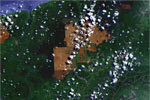
(02/01/2011) Peatlands and rainforests in Malaysia’s Sarawak state on the island of Borneo are being rapidly destroyed for oil palm plantations, according to new studies by environmental group Wetlands International and remote sensing institute Sarvision. The analysis shows that more than one third (353,000 hectares or 872,000 acres) of Sarawak’s peatswamp forests and ten percent of the state’s rainforests were cleared between 2005 and 2010. About 65 percent of the area was converted for oil palm, which is replacing logging as timber stocks have been exhausted by unsustainable harvesting practices.
Greening the world with palm oil?
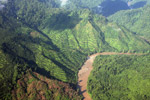
(01/26/2011) The commercial shows a typical office setting. A worker sits drearily at a desk, shredding papers and watching minutes tick by on the clock. When his break comes, he takes out a Nestle KitKat bar. As he tears into the package, the viewer, but not the office worker, notices something is amiss—what should be chocolate has been replaced by the dark hairy finger of an orangutan. With the jarring crunch of teeth breaking through bone, the worker bites into the “bar.” Drops of blood fall on the keyboard and run down his face. His officemates stare, horrified. The advertisement cuts to a solitary tree standing amid a deforested landscape. A chainsaw whines. The message: Palm oil—an ingredient in many Nestle products—is killing orangutans by destroying their habitat, the rainforests of Borneo and Sumatra.
Rainforest people sue logging company, Sarawak govt over planned deforestation
(12/22/2010) A community of forest people is taking a logging company and the state government of Sarawak to court over a plan to log 15,000 hectares of tropical rainforest, reports the Bruno Manser Fund.
Sarawak to double oil palm plantations by focusing on native customary forest
(11/30/2010) Sarawak plans to double its oil palm estate by 2020, reports The Star.
Misleading claims from a palm oil lobbyist
(10/23/2010) In an editorial published October 9th in the New Straits Times (“Why does World Bank hate palm oil?”), Alan Oxley, a former Australian diplomat who now serves as a lobbyist for logging and plantation companies, makes erroneous claims in his case against the World Bank and the International Finance Corp (IFC) for establishing stronger social and environmental criteria for lending to palm oil companies. It is important to put Mr. Oxley’s editorial in the context of his broader efforts to reduce protections for rural communities and the environment.
Photos: Massive logjam in Borneo blocks Malaysia’s longest river
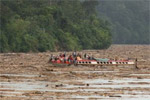
(10/10/2010) A massive 50-km-long (30-mi) logjam has blocked the Rajang river in Sarawak, Malaysian Borneo, bringing river traffic to a standstill and posing a threat to riverbank communities, reports Malaysian state media, Bernama. The Rajang, Malaysia’s longest river, is presently unnavigable, according to Bernama. The source of the logs and debris is believed to be the Baleh River and upper tributaries of the Rajang. Heavy rain reportedly triggered a landslide or landslides at log ponds at a major timber camp.